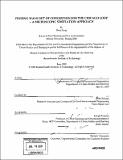Finding ways out of congestion for the Chicago Loop : a microscopic simulation approach
Author(s)
Jiang, Shan, Ph. D. Massachusetts Institute of Technology
DownloadFull printable version (45.36Mb)
Other Contributors
Massachusetts Institute of Technology. Dept. of Urban Studies and Planning.
Advisor
Mikel Murga.
Terms of use
Metadata
Show full item recordAbstract
Over the past two decades, the City of Chicago, as many of its counterparts in the U.S., has experienced a great increase in traffic congestion, which limits regional mobility, induces a huge amount of energy waste and Greenhouse Gas emissions, and impedes economic development. Due to congestion, bus reliability and travel speed has decreased significantly. Since the demand served by the rail system in the Chicago Loop has almost met its capacity during peak hours, and the Loop area concentrates a high percentage of total bus passenger boardings, improving bus Level-of-Service (LOS) in the Loop area is crucial to enhancing passenger mobility in the City of Chicago. As a promising alternative, bus rapid transit (BRT) may reduce negative impacts of traffic congestion; however the real challenge addressed in this thesis is how to evaluate the impacts of such policies on different stakeholders (i.e., auto-drivers and bus-riders) prior to its implementation and how to inform policy-makers on sound policy decisions. In order to address the aforementioned problems, this thesis relies on the preparation of a VISSIM microscopic traffic simulation model for the Chicago Loop area, and the utilization of a GIS traffic network, traffic counts, traffic signals and the CTA bus service data. This study proposes three sets of indicators for the purpose of evaluation of the proposed schemes: 1) bus and auto travel speed, 2) bus reliability, and 3) average bus and auto delay time. (cont.) These performance indicators will serve to compare the current base case to the proposed bus improvement (e.g. BRT) scenarios. Based on the evaluation of several scenarios, this study provides practical recommendations on how to alleviate the impact of traffic congestion on buses in order to improve bus LOS in the Chicago Loop area.
Description
Thesis (S.M. in Transportation)--Massachusetts Institute of Technology, Dept. of Civil and Environmental Engineering; and, (M.C.P.)--Massachusetts Institute of Technology, Dept. of Urban Studies and Planning, 2009. Includes bibliographical references (p. 118-121).
Date issued
2009Department
Massachusetts Institute of Technology. Department of Civil and Environmental Engineering; Massachusetts Institute of Technology. Department of Urban Studies and PlanningPublisher
Massachusetts Institute of Technology
Keywords
Civil and Environmental Engineering., Urban Studies and Planning.